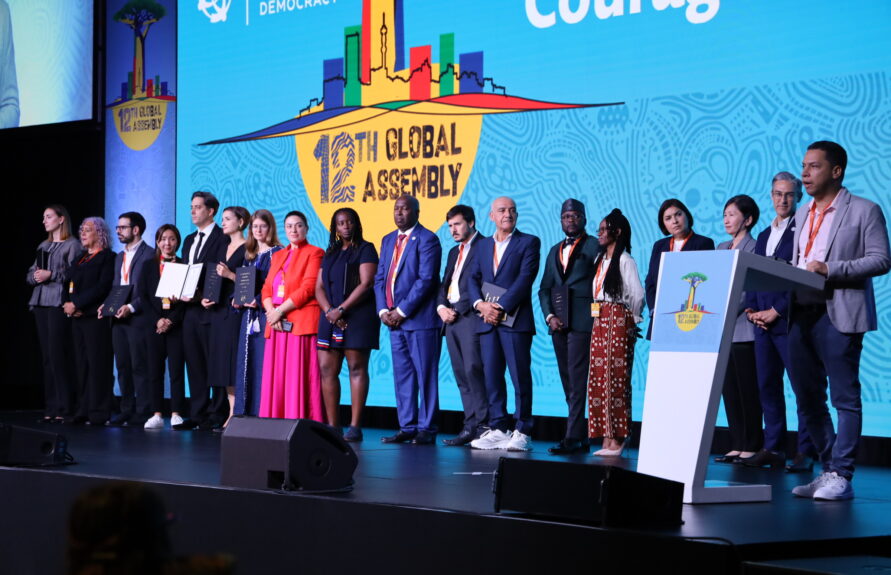
Democracy Courage Tributes
Without global solidarity, the threats to democracy can seem impossible to solve. To express and build solidarity, the World Movement for Democracy and the Hurford Foundation present the Democracy Courage Tributes to give special recognition to the extraordinary efforts of groups and movements working under particularly difficult circumstances. Together, we remind one another that we are not alone in our struggles.
The Democracy Courage Tributes are a highlight of each Global Assembly, and presented at the John B. Hurford Memorial Dinner, which are sponsored by the Hurford Foundation. The dinner was named for the late John Boyce Hurford (1938-2000), an internationalist and philanthropist who played an important role in helping to conceptualize and bring into being the World Movement for Democracy.
TWELFTH ASSEMBLY RECIPIENTS
Read about the 2024 Democracy Courage Tributes here.
Venezuelan Prodemocracy Movement
Presented by Glanis Changachirere (Zimbabwe), watch her remarks here.
Accepted by Rodrigo Diamanti (Un Mundo Sin Mordaza) and Miguel Pizarro (Former Member of Parliament)
Ukrainian Civil Society
Presented by Hassan Shire (Somalia/Uganda), watch his remarks here.
Accepted by Anastasia Rudenko (Rubryka), Tetyana Teren (PEN Ukraine) and Olga Myrovych (Lviv Media Forum)
Palestinian Civil Society
Presented by Oleskandra Matviichuk (Ukraine), watch her remarks here.
Accepted by Omar Shaban (PalThink)
Ugandan LGBTIQ+ Rights Movement
Presented by Mai El-Sadany (Egypt/United States), watch her remarks here.
Accepted by Clare Byarugaba (Chapter Four Uganda) and Pepe Julian Onziema (SMUG)
Eleventh Assembly Recipients
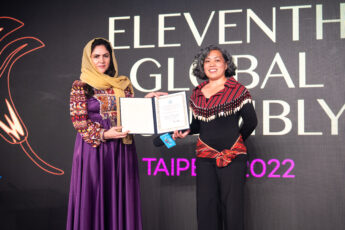
WOMEN-LED HUMAN RIGHTS MOVEMENT IN AFGHANISTAN
Accepted by Fawzia Koofi, former Vice President of the National Assembly.
Since August 2021, the Taliban have rolled back most of Afghanistan’s’ democratic gains, and women and girls have borne the brunt of the Taliban’s repressive policies and actions. Women from diverse groups, such as schoolteachers, government workers and human rights defenders, have mobilize to defy Taliban violence in the streets of Kabul and other major cities, protesting the regime’s draconian laws and policies reversing Afghan women’s hard-won democratic rights of the past 20 years.
This tribute shared solidarity with the work of this women-led human rights movement, which has mobilized public support, including from tribal and religious leaders in the country, to pressure the Taliban to allow girls’ access to education and women’s right to work. The human rights movement represents a changed society in Afghanistan that peacefully resists the Taliban’s repression.
Watch Here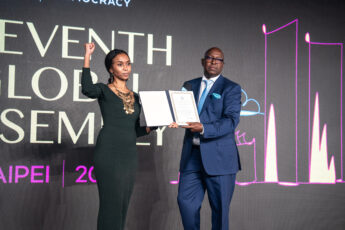
SUDANESE RESISTANCE COMMITTEES
Accepted by Marwa Galaleldin, standing in for Ahmed Shakir of the Sudanese Resistance Committees, who was prevented by the government of Sudan from leaving the country to attend the Global Assembly.
Since December 2018 when street protests erupted throughout the country, Sudanese Resistance Committees have been the backbone of a pro-democracy movement in Sudan. Over the past 4 years, Sudan has experienced two coups d’état and mass violence by the military against civilians. Despite this turmoil, Resistance Committees have organized countless number of peaceful protests against the military regime.
This tribute recognized the innovative tactics that these groups, led by young people, use to encourage citizens to participate in civic space and evolving political processes. These tactics have included public photo exhibitions, movie screenings, and music productions as inclusive ways that the Sudanese people can reclaim civic space in their country.
Watch Here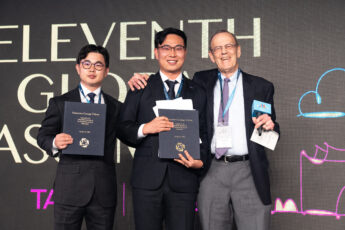
YOUNG NORTH KOREAN DEFECTORS
Accepted by Shiwoo Choi of Now Action & Unity for Human Rights (NAUH) and Daehyeon Park of Woorion (Unity of Bridge).
A new generation of North Korean defectors in South Korea is leading the effort to fight for the freedom of North Korean citizens. Young defectors are overcoming trauma, prejudice, and risks to themselves and their families in order to champion the North Korean human rights movement.
This tribute honored the courage these youth-led groups display in advocating for a democratic future in the world’s most isolated country, uncovering human rights abuses and providing North Koreans with much-needed outside information. Their efforts are inspiring many others to sustain the hope that a better tomorrow will come.
Watch HereTENTH ASSEMBLY RECIPIENTS
Democracy Courage Tribute to Independent Journalists in the Middle East and North Africa
Much of the Middle East and North Africa region has become increasingly hostile to the idea of a free press, and Reporters Without Borders ranked the region at the bottom of all regions in the world in its 2021 World Press Freedom Index. The World Movement honored the courageous work of reporters who remained committed to the values of a free press despite persecution and great personal risk. In this Tribute, the World Movement looked at the problems facing reporters through three lenses: “Those who paid the ultimate price;” “Those who lost their freedom;” and “Those who continue to struggle.”
The Tribute saluted:
- Hisham al Hashimi, who was a prominent advocate for democratic reform and freedom of speech in Iraq and appeared frequently in the media. He was assassinated in Baghdad in 2020.
- Esraa Abdelfattah, who is an Egyptian female human rights defender and journalist at the al-Tahrir newspaper. The Egyptian government jailed her in October 2019 on spurious charges and tortured her in prison. She was released soon after the Tribute presentation on July 18, 2021.
- The Syrian Center for Media and Freedom of Expression (SCM), which is a nonprofit civil society organization working to protect freedom of speech and reporting in Syria. Syria’s Bashar al-Assad regime has shut down their offices many times in attempts to halt their reporting on the country.
The Tribute was accompanied by remarks from Farhad Alaadin of the Iraq Advisory Council and Sherif Mansour of the Committee to Protect Journalists (Egypt).
Democracy Courage Tribute to Advocates for Democracy in East Turkistan, Hong Kong, and Tibet
The World Movement for Democracy presented a Democracy Courage Tribute to “Advocates for Democracy in East Turkistan, Hong Kong, and Tibet Working to Build Solidarity and Resilience” against China’s authoritarian measures. In East Turkistan and Tibet, China has openly moved to erase regional cultures and violated the civil rights of the indigenous ethnic groups on a massive scale. In the past years, it’s been reported that up to 1.8 million Uyghurs and other Muslim minorities are in 380 “political education” camps in East Turkistan. Similarly, Tibet’s people have for generations faced government policies of imprisonment and use of force to limit freedom of religion, speech, or movement. Hong Kong, which had been a comparatively open society, increasingly experiences a searing restriction of civic freedoms with the National Security law of 2020.
In response to these severely restrictive policies of the Chinese Community Party (CCP), the large exile communities from these three places have increasingly worked together. They support each other’s efforts to report abuses, amplify democratic voices, and counter the ’CCP’s disinformation campaigns. The World Movement bestowed a Democracy Courage Award shared by groups from each of these communities who are inspiring examples of this work: Students for a Free Tibet, The Campaign for Uyghurs, and Hong Kong Watch.
In his remarks accepting the Tribute for his group, Dorjee Tseten, Executive Director of Students for a Free Tibet, said “We are building an unprecedented alliance of nations and people who are committed to struggle for freedom and democracy. Tibetans, Uyghurs, Hong Kongers, Taiwanese, Mongolians, Chinese democracy activists, and other activists around the world are coming together to take non-violent actions to resist” authoritarianism.
Democracy Courage Tribute to Artists Fighting for Freedom of Expression in Cuba–The San Isidro Movement
The World Movement for Democracy gave a Democracy Courage Tribute to the Movimiento San Isidro (MSI) and Cuba’s artistic community as they struggle against heightened restrictions that the Cuban regime has imposed on free speech and artistic expression. In 2018 Cuba’s government passed Decree 349, which added new limits on the rights of artistic expression and speech. MSI, formed in reaction to that law, has since become an inspiring example of how “artivism” can be an effective tool against repressive regimes. It encourages artists and intellectuals, as well as Cubans from all walks of life, to stand up against the attempts by their government to silence their voices.
One of the founders and leaders of MSI, Luis Manuel Otero Alcantara, who has been jailed over 70 times for his artivism and protest activities, spoke about the group’s commitment to free speech as he accepted the award on the MSI’s behalf. Alcantara declared, “We want there to be a space for everyone, for all people, for all points of view, for all Cubans.”
Democracy Courage Tribute to Independent and Pro-democracy Journalists in Burma
With a Democracy Courage Tribute, the World Movement for Democracy expressed its solidarity with independent and pro-democracy journalists working in Burma. As Burma’s military junta has committed extensive violence against citizens who have peacefully protested its coup since February 1, 2021, the world has seen an outpouring of support for Burma’s protesters. Without news reports by independent media and pro-democracy citizen journalists, the military junta’s brutal response to peaceful protesters and non-violent resistance by civils society would have kept largely unknown. As Than Win Htut, member of the Democratic Voice of Burma (DVB), explained that since the day one of the coup, the military junta has used internet shutdown as a tool to block the information flow. The World Movement salutes the bravery of these journalists who have risked their lives in support of free speech and democracy.
Ninth Assembly Recipients
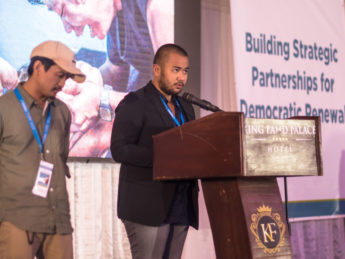
Nightwatchers Photojournalists in the Philippines
Accepted by Raffy Lerma and Ezra Acayan of the Nightwatchers.
The Nightwatchers are a group of photojournalists take the “night shift” to capture and publish images which bring the disturbing reality of Duterte’s war on drugs to light.
With this Tribute, the World Movement honors the work of the Nightwatchers who operate at great personal risk in an environment where the president has endorsed the killing of activists who “obstruct justice.”
Watch Here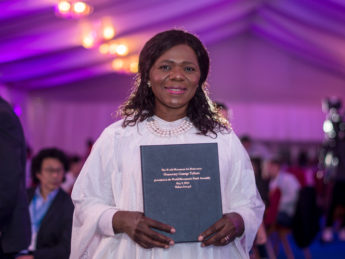
Advocates for the Rule of Law in Africa
Accepted by Thuli Madonsela, former Public Protector of South Africa (2009-2016).
Over the past year, advocates for the rule of law in South Africa, Kenya, and Liberia have displayed true independence in holding fellow government leaders accountable and protecting the integrity of democracy.
With this Tribute, the World Movement wishes to recognize both the engaged members of civil society and the courageous defenders of democracy within government institutions who remain committed to transparency, integrity, and accountability in Africa.
Watch Here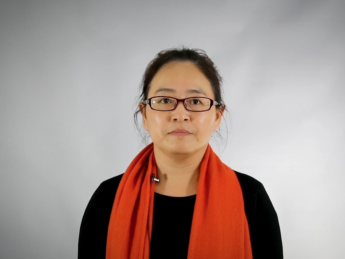
Human Rights Lawyers in China
Accepted by Jin Bianling, the wife of Jiang Tianyong, a political prisoner who was detained and forcibly disappeared by Chinese authorities.
On July 9, 2015, Chinese state security forces arrested, detained, disappeared, and forcibly questioned more than 300 human rights lawyers and legal activists in a widespread repression which would later be known as the “709” crackdown—one of the largest coordinated suppressions of human rights defenders in decades.
With this Tribute, the World Movement remembers and honors the resilient human rights lawyers of China who defend others at great personal risk.
Watch HereOTHER PAST RECIPIENTS
-
Eighth Assembly
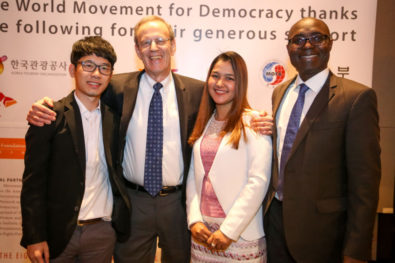
The Umbrella Movement
Accepted by Nathan Law Kwun-chun, secretary general of the Hong Kong Federation of Students.
The Umbrella Movement’s bold call in the fall of 2014 for a free and fair election process to select the city’s leaders brought thousands into the streets to demonstrate peacefully in Hong Kong.Advocates for the Rohingya People
Accepted by Wai Wai Nu, founder of the Women’s Peace Network in Burma.
Groups such as the Women Peace Network have worked courageously with and on behalf of the Rohingya people, building their political awareness and calling international attention to the systemic discrimination and human rights abuses they face.Investigative Journalists in Africa
Accepted by Rafael Marques de Morais, renowned Angolan investigative journalist and founder of Maka Angola.
In Africa’s hostile environment towards journalists, a number of brave individuals have managed to break through the bonds of censorship and corrupt media practices to score victories for freedom of the press. -
Seventh Assembly
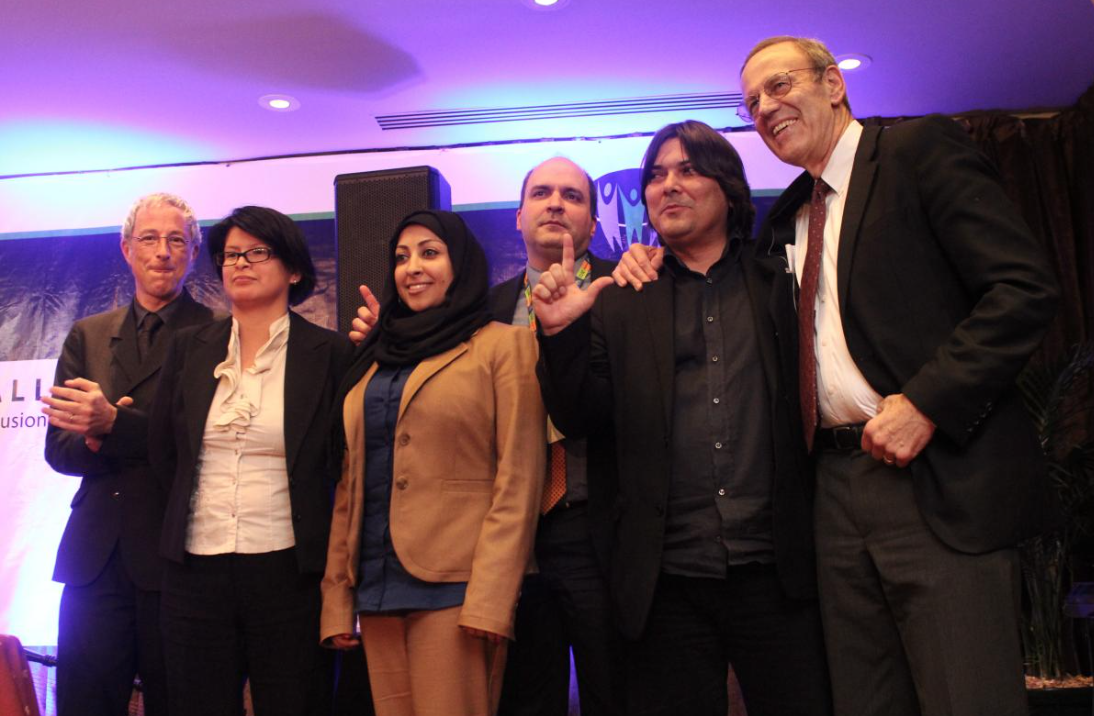
From left to right: Steering Committee member Antoine Bernard (France); Veronica Ferrari (Peru), who accepted the Tribute for Advocates of Sexual Minorities Worldwide; Maryam Al-Khawaja (Bahrain), who accepted the Tribute on behalf of Bahraini Human Rights Defenders; Steering Committee member Carlos Ponce (Venezuela); Regis Iglesias (Cuba), who accepted the Tribute on behalf of the Pro-Democracy Movement in Cuba; and National Endowment for Democracy president Carl Gershman (United States). Messrs. Bernard, Ponce and Gershman presented the Tributes to the recipients from Peru, Cuba, and Bahrain, respectively.
Human Rights Defenders in Bahrain
Accepted by Maryam Al-Khawaja, co-director of Gulf Center for Human Rights.
On February 14, 2011, Bahrainis engaged in mass protest to speak out against their country’s monarchic regime, demanding that state authorities respect human rights, institute democratic reform, and recognize the equality of all Bahraini citizens. The protests crossed sectarian lines and drew thousands into the streets, but were put down one month later when Bahrain invited armed forces from the Gulf Cooperation Council countries to assist in quelling the mass uprising. Although the regime launched a commission of inquiry and promised restitution to victims of the violent crackdown, the commission has proved largely ineffective at best and disingenuous at worst. Prominent human rights defenders such as Abdulhadi al-Khawaja and Abdul Jalil al-Singace remain in prison, while others, such as Nabil Rajab, Zaynab al-Khawaja, Maryam al-Khawaja, and Muhammad al-Masqati, are subject to constant harassment and intimidation. Nevertheless, these brave individuals remain at the vanguard of Bahrain’s democracy movement, calling for peaceful political dialogue, democratic reform, and reconciliation.
Advocates for the Rights of Sexual Minorities Worldwide
Accepted by Veronica Ferrari, president of Homosexual Movement of Lima.
In the face of violence, discrimination, and other forms of harassment, advocates for the rights of sexual minorities worldwide have demonstrated courage, creativity, and perseverance in their struggle for LGBT rights and equal citizenship. Organizing one of the most important civil rights struggles in the world today, these advocates often face tremendous difficulties in advancing their agenda given that there is much less global consensus on the issue of sexual equality and privacy rights, as many people continue to argue that personal, private sexual identity is something the state, or a particular religious group, has a right to regulate or control. Yet advocates for the rights of sexual minorities continue to defend the rights of LGBT individuals and challenge conservative attitudes despite tremendous personal, professional, and physical risk of injury. Together they have worked to form a truly global, transnational network that transcends borders and traditional understandings in order to advance the rights of minority individuals in societies where the majority has denied the minority the same claims to equality and privacy.
Pro-Democracy Movement in Cuba
Accepted by Regis Iglesias, member of the Christian Liberation Movement
Despite tremendous repression of political dissent and a culture of fear in which ordinary people and independent-thinking Cubans are afraid to speak up, a wide spectrum of organizations and individuals located inside Cuba continue to advance democracy and human rights. Together comprising the pro-democracy movement in Cuba, these activists work at great personal risk to themselves. Pro-democracy activists are routinely imprisoned, detained, terminated from their jobs, and otherwise harassed, oftentimes before they even commit any one of the many crimes that make legal dissent nearly impossible. Under a “dangerousness” provision in Cuba’s penal code, the state is allowed to imprison individuals on suspicion that they might commit a crime in the future. In the past year, two great democracy activists, Laura Pollán and Oswaldo Payá, died under strange circumstances. Yet Cuban advocates for change continue to take advantage of whatever space is afforded them however small, using new technologies to circumvent government censorship and finding innovative ways to collaborate on advocating about issues of citizen concern in order to appeal to ordinary citizens.
-
Sixth Assembly
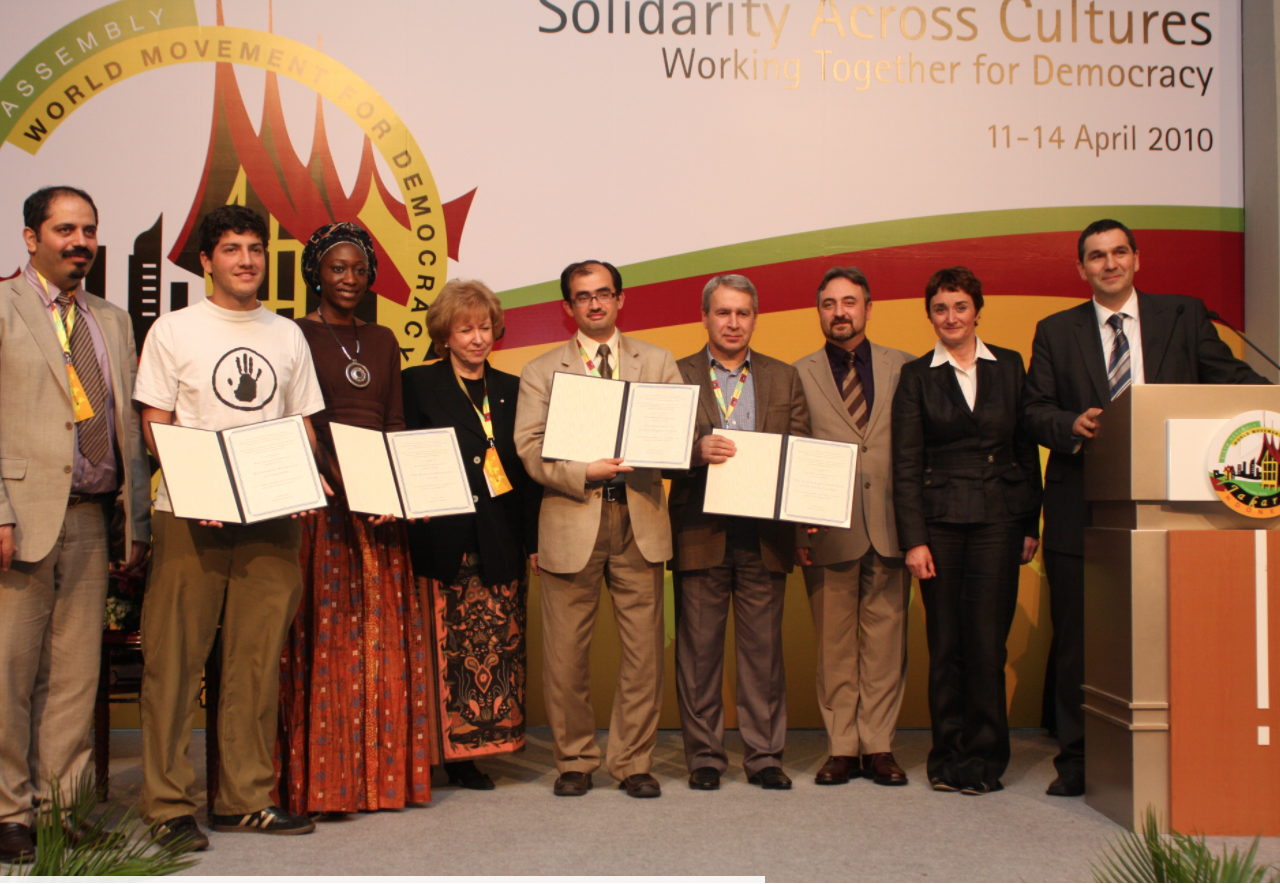
Democracy Courage Tribute recipients pictured with World Movement Steering Committee Chair Rt. Hon. Kim Campbell (Canada), who chaired the John B. Hurford Memorial Dinner, as well as World Movement Steering Committee members, Igor Blaževic (Bosnia), who chaired the Democracy Courage Tribute presentations, Yuri Dzhibladze (Russia), and Jana Hybášková (Czech Republic). They are joined by Ali Afshari of the Iranian Democratic Student Association.
The Movement for Human Rights in Syria
Accepted by Radian Ziadeh, executive director of Syrian Center for Political and Strategic Studies and founder of the Damascus Center for Human Rights Studies.
In 2009, Syria threw hundreds of democratic activists in prisons, where they joined Syrian dissidents asso- ciated with the 2005 Damascus Declaration for demo- cratic reform. The Declaration called upon democratic forces to undertake “a salvation task of change that takes the country from being a security state to a civ- il state.” Democrats in Syria today face a climate of impunity where government security forces arbitrari- ly arrest, detain and torture critics of the regime. This diverse and courageous movement struggles to return Syria to the days before the current regime took power in 1963 when the country had free media, an indepen- dent parliament, and strong democratic institutions.
The Student Movement in Venezuela
Accepted by Roberto Patiño, student movement supporter and co-founder of the Caracas Mi Connive Movement.
When President Hugo Chavez attempted to legiti- mize his authoritarian rule by amending Venezuela’s Constitution in December 2007, a non-partisan stu- dent movement rose up to defeat it. Inspired by the nonviolent philosophy of Dr. Martin Luther King, Jr., the movement had mobilized earlier that year, holding peaceful demonstrations across the country to protest the government’s closing of the country’s oldest and most popular media outlet. The student reaction to the TV closing and referendum to amend the Constitution was motivated not by political ideology or partisan politics, but by the notion that “in a democracy all sides should be welcome.” Despite government provo- cation and calls for physical attacks on students, the movement continues to focus on the peaceful promo- tion of democracy by training observers to monitor elections and encouraging young people to register to vote.
The Women’s Movement in Iran
Accepted by Ali Afshari, Iranian activist and student leader.
Beginning with their participation in the constitu- tional revolution of 1906, Iranian women have struggled courageously and steadfastly for equal treatment under the law. The regime that came to power in 1979 nullified the legislation that gave women the equal rights they had worked for decades to achieve. Through years of struggle the women’s movement has gained political maturity; the success of the movement became apparent to the world when years of organiz- ing and campaigning brought the women’s networks to the forefront of the prodemocracy demonstrations leading to and following the 2009 elections. Despite persecution, they continue their struggle with dignity, courage, and perseverance.
The Human Rights Defenders in the North Caucasus
Accepted by Dokka Itslaev, Russian human rights defender.
The human rights situation and conditions for human rights defenders in the North Caucasus have become increasingly alarming and violent since the brutal murder last summer of Natalia Estemirova. Abducted from her Grozny office at the human rights group Memorial, Estemirova was found shot dead later the same day in neighboring Ingushetia. Threats, inci- dents of intimidation, and murders directed against activists and journalists in the region continue with impunity. The targets of this violence are Russia’s best hope and moral conscience. They keep alive the possibility that Russia will one day change course, turn its back on extreme nationalism, address the severe internal problems that threaten its well-being, and embrace the values of human rights and the rule of law. -
Fifth Assembly
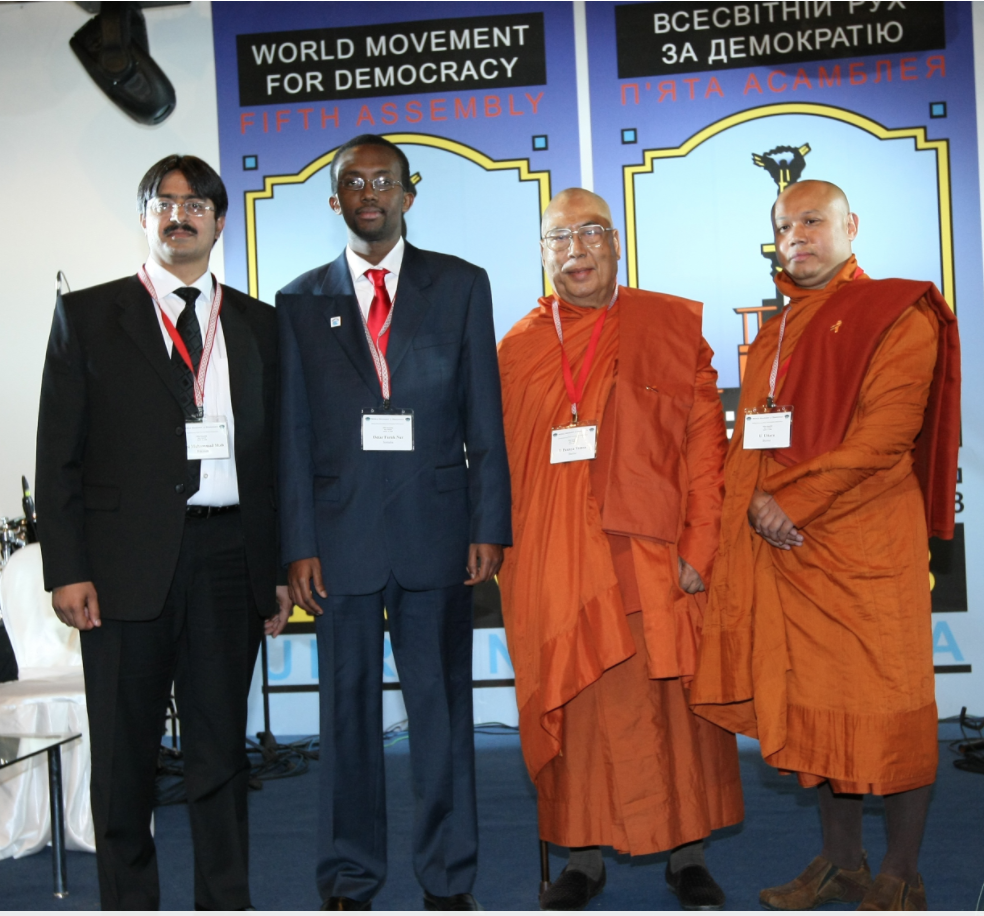
From left to right: Syed Muhammed Shah (Pakistan), receiving the Tribute on behalf of the Legal Community of Pakistan; Omar Faruk Osman (Somalia), receiving the Tribute on behalf of the Independent Journalists of Somalia; the Venerable U Uttara and the Venerable Sawyadawgyi U Pannya (Burma), receiving the Tribute on behalf of the Monks of Burma.
The Monks of Burma
Accepted by the Venerable Sawyadawgyi U Pannya and the Venerable U Uttara
To speak out against the treatment of impoverished Burmese citizens, revered Buddhist monks led peaceful demonstrations throughout Burma in July and August 2007. The monks became a powerful symbol of the ruling junta’s loss of legitimacy when they began to refuse alms from members of the military and support political reconciliation in the country. Although the demonstrations were met with a brutal crackdown by the Burmese junta, the monks’ peaceful protests sparked the world’s hope for a democratic transition in the country.
The Legal Community of Pakistan
Accepted by Syed Muhammad Shah, president of Lahore Bar Association
In March 2007, Pakistan’s then President and Army Chief, Pervez Musharraf, triggered the most severe crisis of his tenure when he fired the Chief Justice of the Supreme Court, Iftikhar Mohammad Chaudhry. The ensuing lawyer-led protests were unprecedented and met with a police crackdown that was broadcast live. The live video gave ordinary Pakistanis direct evidence of the strong civil resistance and the government’s heavy-handed suppression. The lawyers’ efforts to promote the rule of law and preserve the sanctity of the Constitution have provided the inspiration and momentum for a broader democratic movement in Pakistan.
The Independent Journalists of Somalia
Accepted by Omar Faruk Osman, Secretary-General of the Eastern Africa Journalists Association
Independent Somali journalists face deadly threats in their line of work, often with little to no local support. In 2008, seven Somali journalists were killed in targeted assassinations. Somalia has experienced a recent and growing widespread state-sponsored crackdown on freedom of expression – the government has shuttered print and broadcast outlets, stolen equipment, detained journalists, and accused independent stations of siding with anti-government insurgents.
-
Fourth Assembly
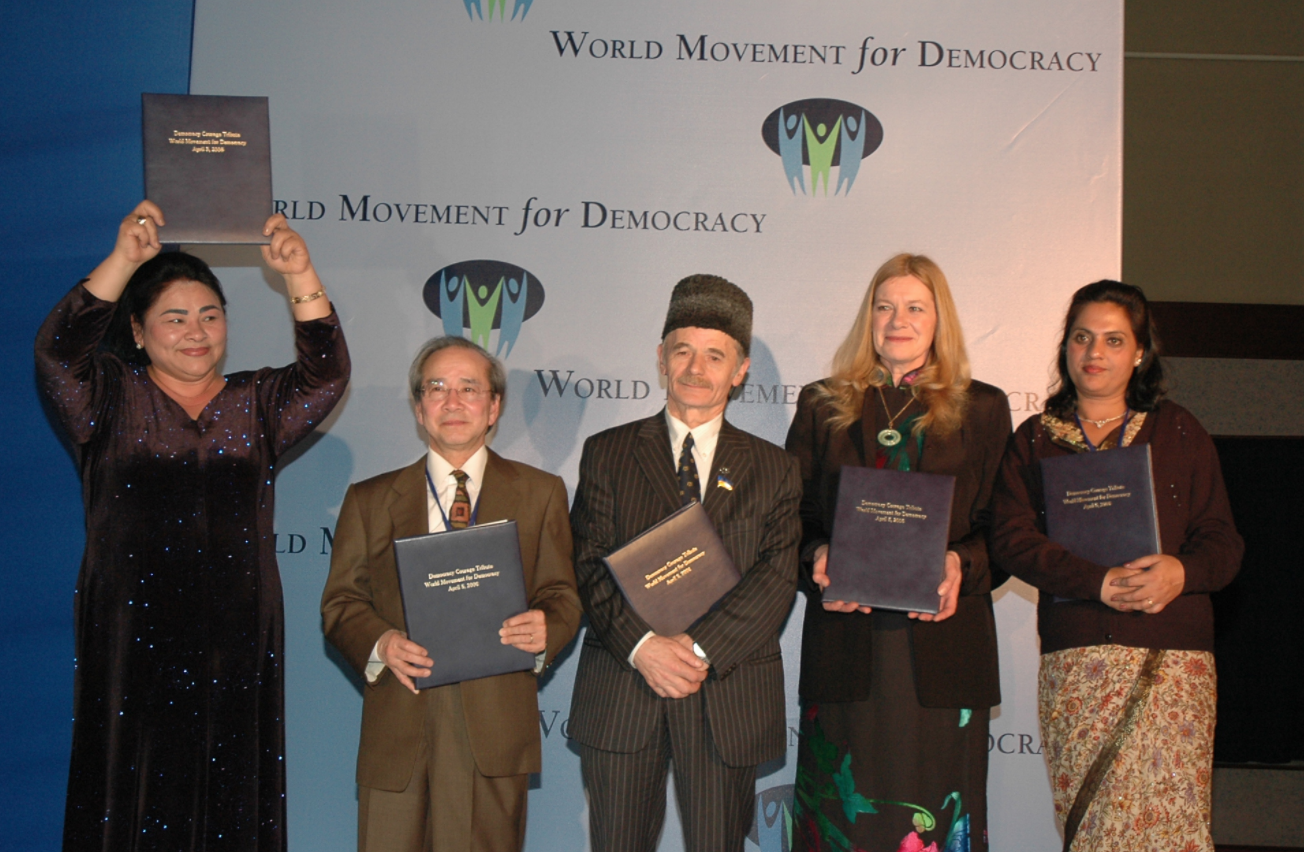
Recipients of Democracy Courage Tributes, from left to right: Vasila Inoyatova, receiving the Tribute on behalf of the Human Rights and Democracy Movement in Uzbekistan; Vo Van Ai, receiving the Tribute on behalf of Democracy Activists in Vietnam; Mustafa Djemilev, receiving the Tribute on behalf of the Crimean Tatars and their Mejlis (Parliament); Penelope Faulkner, also receiving the Tribute on behalf of Democracy Activists in Vietnam; Puspa Bhusal, receiving the Tribute on behalf of the Civil Society of Nepal.
The Democracy Activists in Vietnam
Accepted by Vo Van Ai, Vietnamese Activist
Hoang Minh Chinh, a former high-ranking member of the Communist Party, and Buddhist dissident Thich Quang Do, Deputy Leader of the Unified Buddhist Church of Vietnam, spent over 25 years in detention for his non-violent advocacy of religious freedom, human rights, and democracy. Even from prison, these men and many others like them from both the secular and religious communities have dared to disseminate messages defending human rights, increased pluralism, and the rule of law in Vietnam.
The Human Rights and Democracy Movement in Uzbekistan
Accepted by Krysztof, Uzbek Activist.
In 2006, more than a dozen Uzbek activists, including human rights defenders, journalists, and opposition politicians, have been jailed on spurious charges. We pay tribute to the following groups that have continued their extraordinary advocacy in the face of this campaign of repression:
- Human Rights Society of Uzbekistan-Ezgulik,
- Mothers Against the Death Penalty and Torture,
- Legal Aid Society of Uzbekistan,
- Human Rights Society of Uzbekistan,
- Ozod Ovoz,
- Arena news service,
- Burning Hearts,
- Appellation,
- members of the political opposition parties Free Peasant’s Party, Sunshine Uzbekistan, Erk, and Berlik.
The Civil Society of Nepal
Accepted by Puspa Bhusal, Nepalese Activist.
From 1996 until 2006, Nepal was besieged by one of Asia’s deadliest conflicts that resulted in more than 10,000 deaths. In the decade and a half since its democratic transition, Nepal has struggled to contend with both a Maoist insurgency and a repressive and anti-democratic monarchy. Nepal’s tenacious civil society, which must work in the limited space between the Maoists and the monarchy, continues to fight to re-establish the democracy.
The Crimean Tartars and their Mejlis (Parliament)
Accepted by Mustafa Djemilev, former Chairman of the Mejlis of the Crimean Tatar People and a member of the Ukrainian Parliament.
The Crimean Tartars fostered a new democratic culture through their self-governing parliamentary body “Mejilis.” Soviet dissident, former Chairman of the Mejilis, and member of the Ukrainian Parliament, Mustafa Djemilev is recognized as the leader of the Crimean Tartar National Movement and their struggle for democracy in Crimea, Ukraine.
-
Third Assembly
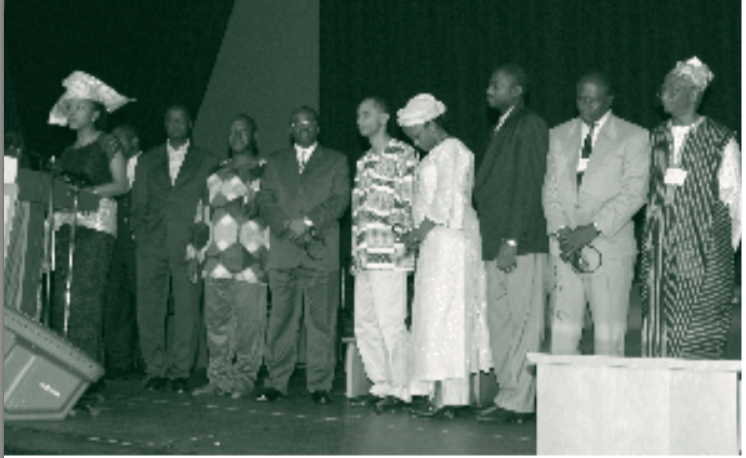
Ayo Obe presents Courage Tribute to the Mano River Union Civil Society Movement.
The Mano River Union Civil Society Movement (Liberia, Sierra Leone, Guinea)
Accepted by the Mano River Union Civil Society Movement.
Uniting more than 40 groups from Liberia, Sierra Leone, and Guinea, members of the Mano River Union Civil Society Movement have demonstrated extraordinary courage in mobilizing for peace and democracy. Despite harassment and torture, they have continued to appeal for peace negotiations among the governments and combatants in the region, and have organized demonstrations and meetings calling for greater respect for democracy and human rights. Among the organizations leading the Movement are the Association of Liberian Professional Organizations, the Press Union of Liberia, the Campaign for Good Governance of Sierra Leone, and the Organisation Guineene des Droits de l’Homme.
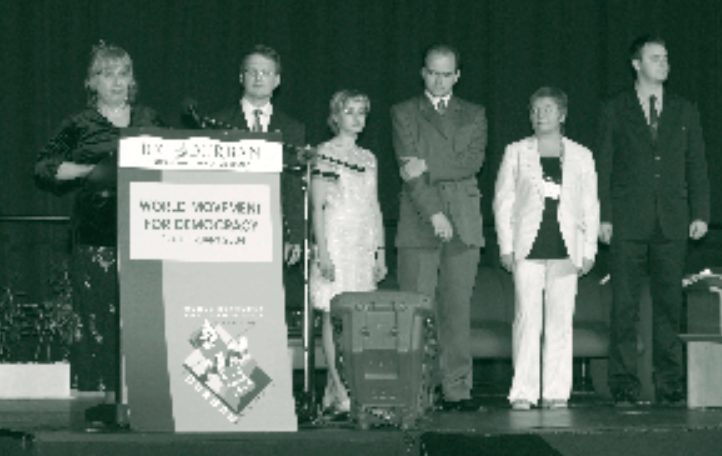
Irena Lasota presents Courage Tribute to the Democracy Movement in Belarus.
The Democracy Movement in Belarus
Accepted by the Democracy Movement in Belarus.
The Democracy Movement in Belarus continues to be heavily repressed for opposing the Lukashenko regime. Belarusians’ elections are rigged, their human rights are violated, and independent organizations are forced to shutdown. The local movement struggling to promote democracy and economic reform is forced to operate in a difficult climate.
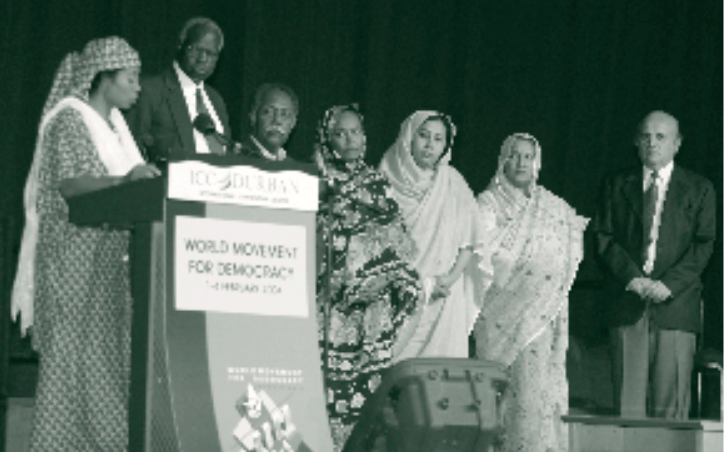
Ayesha Iman presents Courage Tribute to the Democracy Movement in Sudan.
The Democracy Movement in Sudan
Accepted by the Democracy Movement in Sudan
In the early 2000s, several civil society organizations, as well as the independent press and trade unions, resurfaced in both northern and southern Sudan. Largely unrecognized and often at great personal risk, members of this democratic movement experience hostility on all sides of Sudan. Despite the danger, civil society worked to end the 30-year civil war by building the foundations for sustainable peace, democracy, and human rights in the country. Among the groups leading this movement were
- the Babiker Badri Scientific Association for Women Studies
- the Kwoto Cultural Center
- the Khartoum Monitor
- the Sudan Human Rights Organization
- the New Sudan Council of Churches
The Israel-Palestine Center for Research and Information (Israel) /Panorama (Palestine)
Accepted by the Israel-Palestine Center for Research and Information, based in Israel, and to Panorama, based in Palestine.
Despite working under challenging circumstances in Palestine and Israel, both civil society organizations Panorama and the Israel-Palestine Center for Research and Information (IPCRI) cultivated a strong commitment to democratic peace. Panorama’s innovative approaches to civic education and youth outreach throughout Palestine sustained optimism for the prospects for Palestinian democracy. IPCRI’s contribution to governance and peace issues affecting Israelis and Palestinians with thorough research, training, and the outline of policy prescriptions for peace, put the organization at the forefront of the peace process.
-
Second Assembly
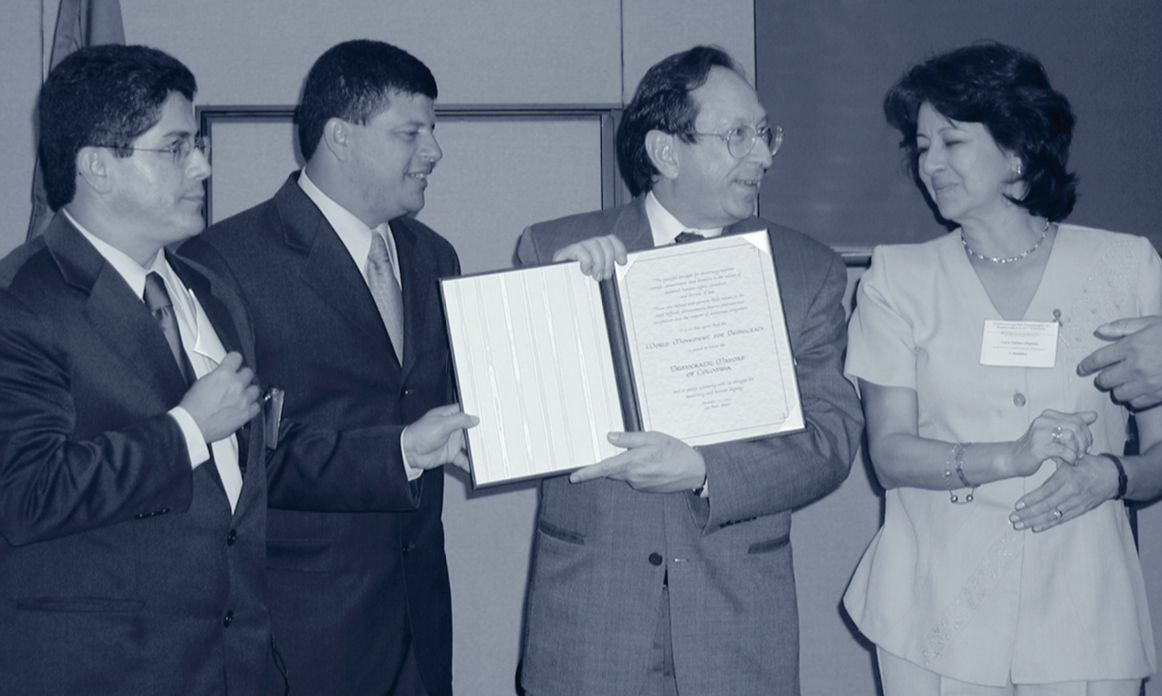
Colombian mayors accept their Democracy Courage Tributes.
The Colombian Democratic Mayors
Accepted by the Colombian Mayors.
Colombia’s mayors have demonstrated a high level of commitment to democracy and extraordinary courage. Over the course of three years, 32 mayors were assassinated, including 20 candidates for the mayoral elections held in October 2000. Their unwavering commitment to keep the democratic hope alive, despite assassination threats to themselves and their families, are an inspiration to their constituents and the world.
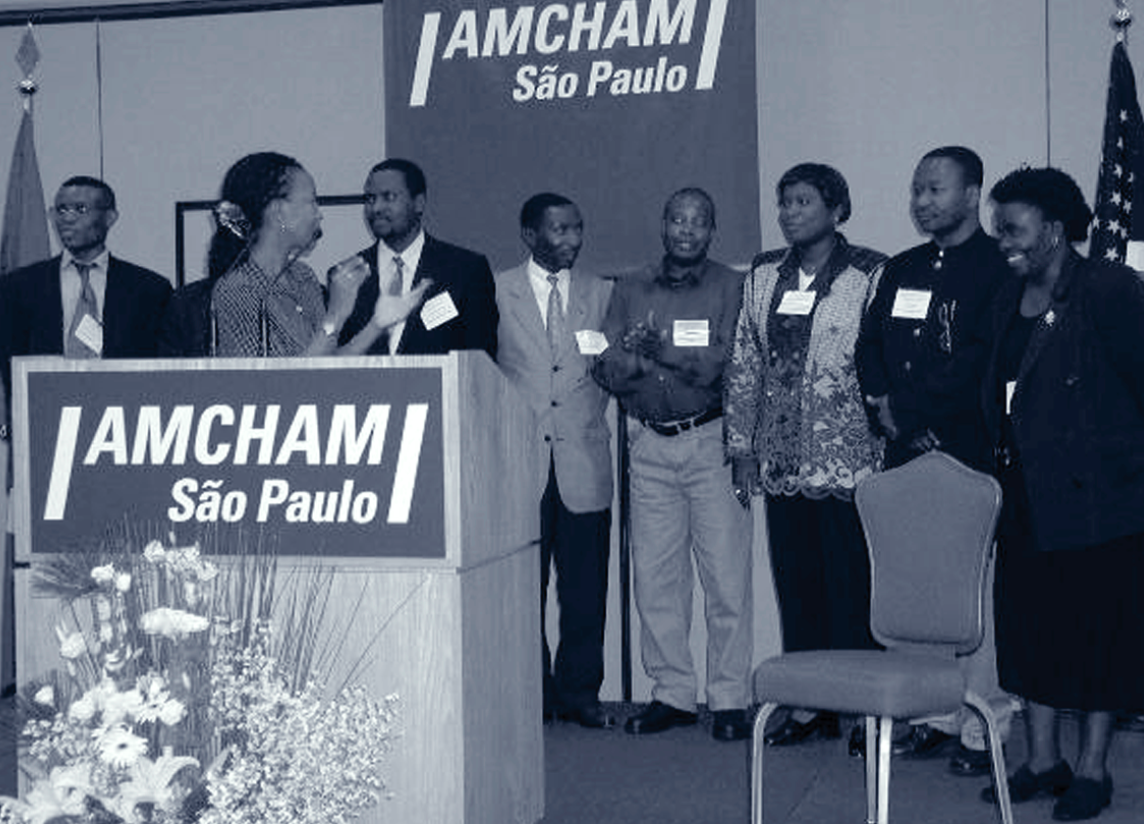
Steering Committee Member Ayo Obe (at podium) applauds leaders of the Civil Society Movement of the Democratic Republic of Congo.
The Civil Society Movement of the Democratic Republic of Congo
Accepted by the leaders of the Civil Society Movement of the Democratic Republic of Congo.
The Civil Society Movement of the Democratic Republic of Congo, composed of thousands of faith-based organizations, human rights groups, and members of the independent press, was a beacon of hope in a country enmeshed in one of the world’s largest and most destructive wars. In the 1990s, after the country transitioned from dictatorship to democracy, the Civil Society Movement continues presented a non-violent option as an end to war in the Congo.
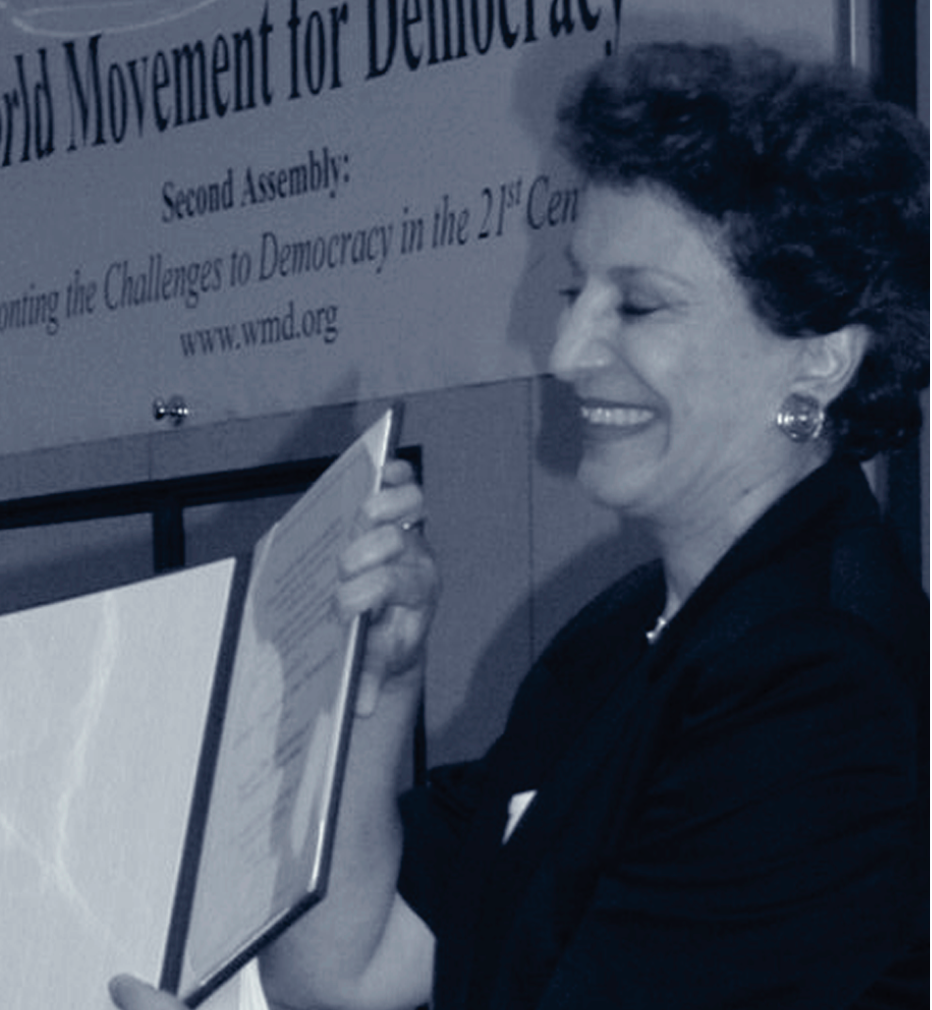
Steering Committee Member Mahnaz Afkhami accepts the tribute on behalf of Iran’s Pro-Democracy Student Movement.
Iran’s Pro-Democracy Student Movement
Accepted by Mahnaz Afkhami, former Steering Committee member, founder and president of the Women’s Learning Partnership for Rights, Development, and Peace.
The pro-democracy student movement in Iran spearheaded the struggle for basic freedoms in the country. The Iranian government targeted members of the peaceful movement with unreasonable search and seizure, incarceration, denial of legal representation, excessive prison terms, and torture.
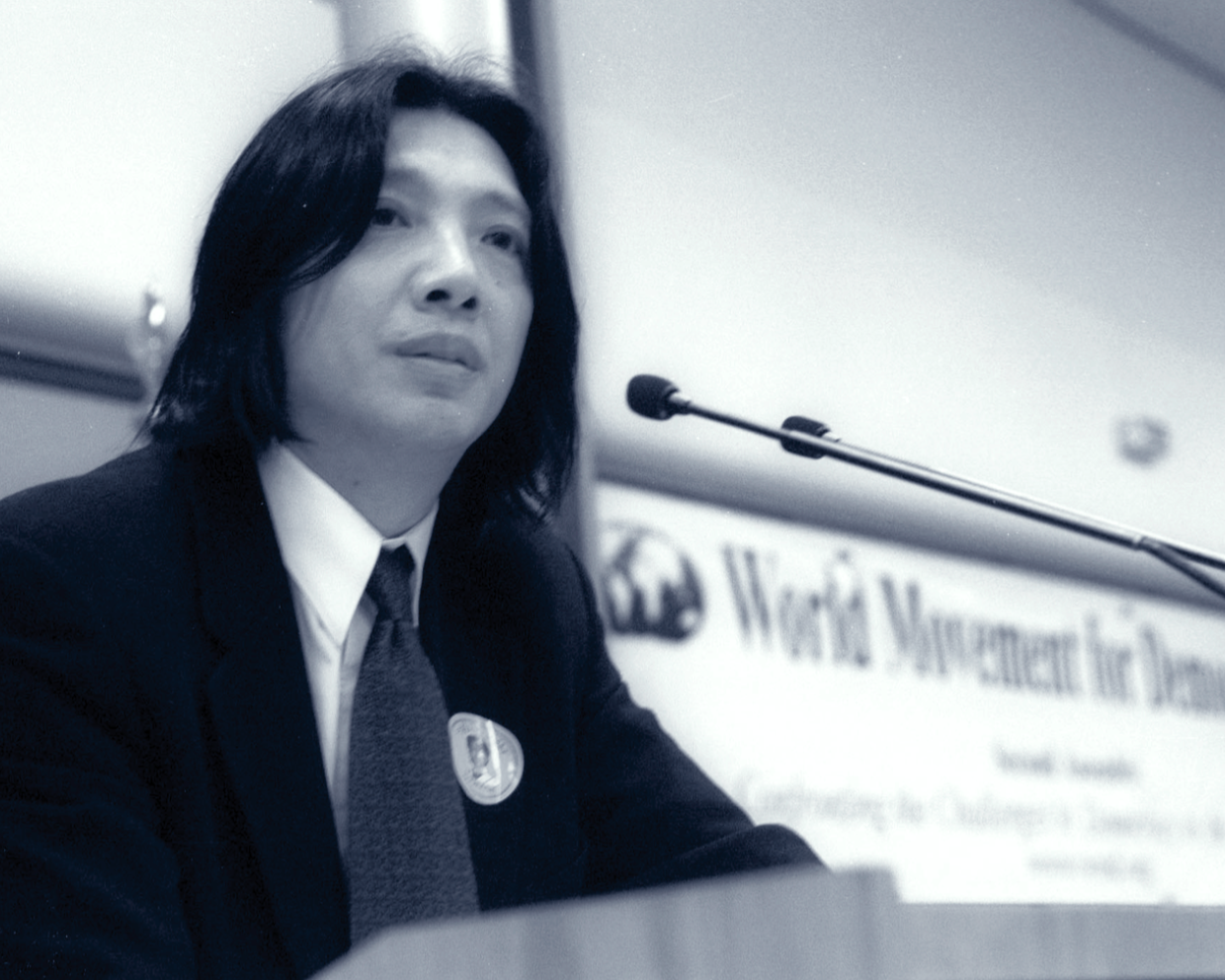
Steering Committee Member Xiao Qiang accepts the tribute on behalf of the Tiananmen Mothers.
Tiananmen Mothers Network
Accepted by Xiao Qiang, former Steering Committee member and founder and editor-in-chief of China Digital Times
The Tiananmen Mothers Network played a crucial role in advancing the idea of accountability for human rights abuses in China. Founded in the aftermath of the June 4, 1989 massacre in Beijing, the network has made extraordinary efforts to illustrate an accurate picture of what happened by documenting the cases of people who were killed or wounded. It has provided moral support for the victims’ families and pursued unprecedented legal action. The network’s founder, Ding Zilin, the mother of a victim of the massacre, has suffered enormous persecution for her insistence on speaking the truth and calling for an end to impunity.
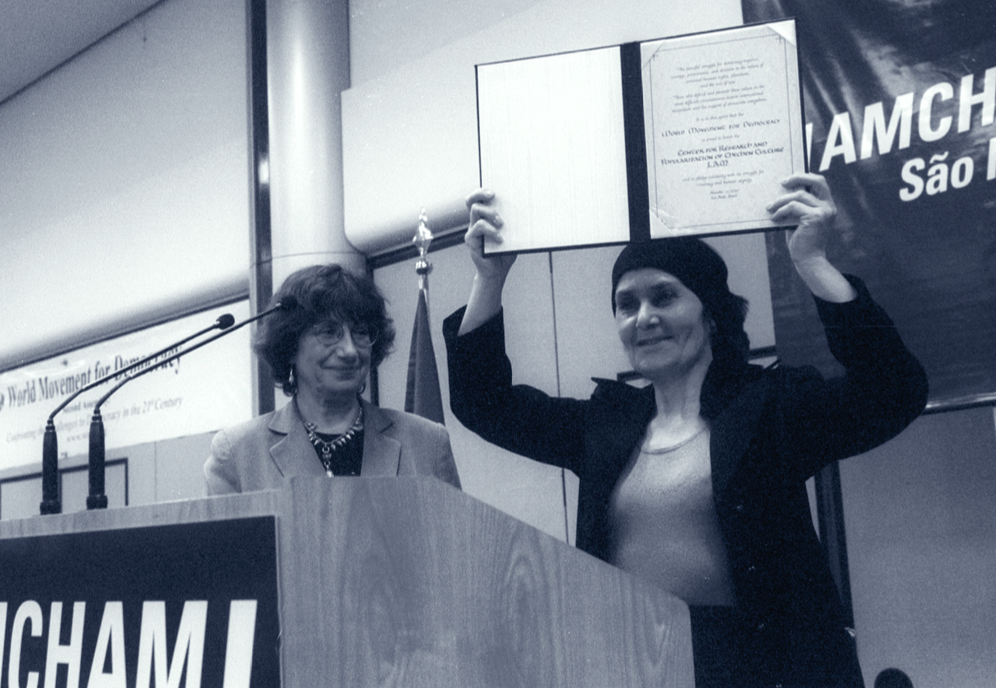
Steering Committee Member Irena Lasota looks on as Zulekikhan Bagalova accepts the Democracy Courage Tribute for the Chechen NGO, LAM.
LAM
Accepted by Zulekikhan Bagalova, member of LAM.
LAM, a Chechen NGO, was founded in 1996 to promote education and human values. With the out- break of the second war in September 1999, LAM (“mountain”) broadened that role to assist refugees, provide informa- tion to relief organizations, dissemi- nate bulletins about rights abuses to the outside world and bring Chechens from across the political spectrum together to develop plans for ending the war and for post-war reconstruction. Despite the brutal conditions under which it operates, LAM continues to organize demo- cratic education programs in schools and in refugee camps.
